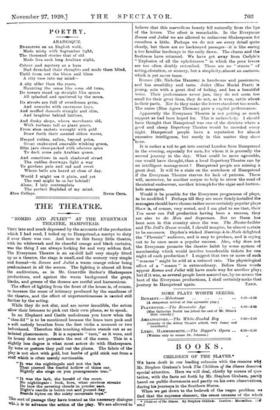THE THEATRE.
"ROMEO AND JULIET" AT THE EVERYMAN THEATRE, HAMPSTEAD.
VERY late- and much depressed by the accounts of the production -which I had read, I toiled up to Hampstead, a martyr to duty if ever there was one. And here in this funny little theatre, with its whitewash and its cheerful orange and black curtains, wee the thing X am always looking for and very seldom find. The Everyman Theatre IS an ex-drill hall very simply fitted up as a theatre, the stage is small, and the scenery very simple and formal—in Romeo and Juliet a warm orange colour being predominant in all the scenes. The lighting is almost all from the auditorium, as in Mr. Granville Barker's Shakespeare productions, and against the warm background the greys, blacks, and greens of the dresses are restful and harmonious.
The effect of lighting from the front of the house is, of course, to inorease the sense of intimacy produced by the smallness of the theatre, and the effect of unpretentiousness IS carried still further by the acting.
While they do not slur, and are never inaudible, the actors allow their listeners to pick out their own plums, so to speak.
In an Elephant and Castle melodrama you know when the " chee-ild " is to be mentioned because the limes turn pink and a soft melody breathes from the first violin a moment or two beforehand. Therefore this touching allusion stands out as an isolated phenomenon. It is a separate "turn," as it were, and its honey does not permeate the rest of the scene. This in a slightly less degree is what most actors do with Shakespeare. lly tone or gesture they pull out the plums. The fabrics of the Play is not shot with gold, but knobs of gold stick out from a stuff which is often merely serviceable.
"It was the nightingale and not the lark That pierced the fearful hollow of thine ear. Nightly she sings on you pomegranate tree."
"It was the lark, the herald of the morn.
No nightingale: look, love, what envious streaks Do lace the severing clouds in yonder east. Night's candle is burnt out and jocund day Stands tiptoe on the misty mountain tops."
This sort of passage they have treated as the necessary dialogue whill is to advance the action of the play. We are allowed to believe that this marvellous beauty fell naturally from the lips of the lovers. The effect is remarkable. In the Everyman Romeo and Juliet we are allowed to rediscover Shakespeare for ourselves a little. Perhaps we do not see every detail quite clearly, but there are no hackneyed passages —it is like seeing a too familiar landscape in the early dawn. The charm and the freshness have returned. We have got away from Carlyle's "Explosion of all the upholsterers" in which the poor lovers are too often doubly entombed. There are no " stunts " of acting, elocution, or scenery, but a simplicity,almost an easiness, which is yet never tame.
Romeo (Mr. Nicholas Hannan) is handsome and passionate, and has sensibility and taste. Juliet (Miss Muriel Pratt) is young, acts with a great deal of feeling, and has a beautiful voice. Their performance never jars, they do not seem too small for their great lines, they do not, as it were, rattle about in their parts. Nor do they make the lovers stand out too much. The nurse (Miss Agnes Thomas) gave a capital performance.
Apparently the Everyman Theatre is not getting as much support as had been hoped for. This is melancholy. I should have thought that Hampstead was one of the districts where a good and cheap Repertory Theatre would be crowded every night. Hampstead people have a reputation for almost excessive intelligence, but surely in this matter they show `hone.
It is rather a toil to get into central London from Hampstead in the evening, especially for men, for whom it is generally the second journey in the day. What could be more agreeable, one would have thought, than a local Repertory Theatre run by an intelligent management ? Hampstead people are missing a great deal. It will be a stain on the soutcheon of Hampstead if the Everyman Theatre starves for lack of patrons. There will, moreover, be another corpse to help to strew the road of theatrical endeavour, another triumphfor the cigar-and-button- hole managers.
Would it be possible for the Everyman programme of plays. to be modified ? Perhaps till they are more firmly installed the managers should have oilman rather more certainly popular plays Shaw is, of course, very sound, and I am glad to see that, their You never can Tell production having been a success, they are also to do Man and Superman. But no Ibsen has been seen in this country since the war. The Master-builder and The Doll's House would, I should imagine, be almost certain to be successes. Dryden's wicked Marriage-d-la-Mode delighted
the "Phoenix" audience, and is easy to produce, and is crying out to be once more a popular success. Also, why does not the Everyman promote the theatre habit by some system of membership which would involve transferable tioketa for one night of each production ? I suggest that two or more of such " seasons " might be sold at a reduced rate. The physiological
effect of a " season " is extraordinary. Before these words appear BOW° and Juliet will have made way for another play; but if it was, as several people have assured me, by no means the best of the Everyman produotions, I shall certainly make that






































 Previous page
Previous page